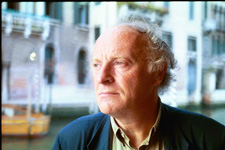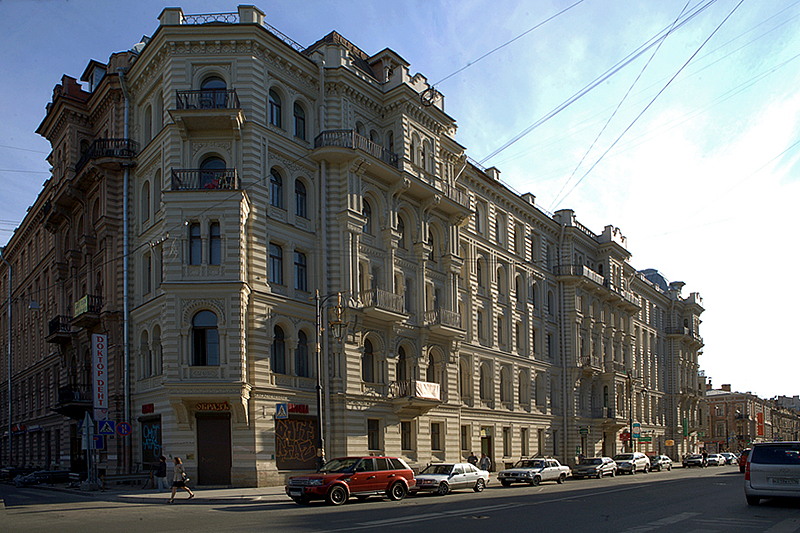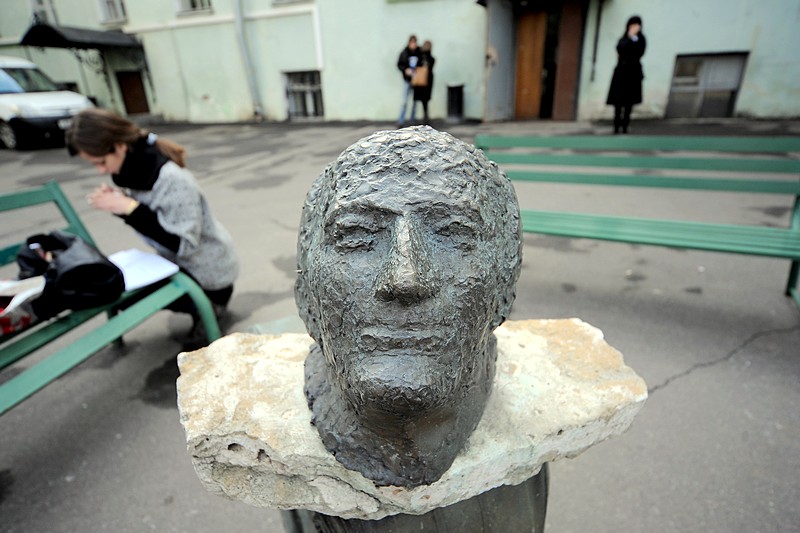Joseph Brodsky

Poet, essayist
Born: Leningrad - 24 May 1940
Died: New York - 28 January 1996
One of the most celebrated poets of the 20th century, Joseph Brodsky, when asked if he was American or Russian, replied: "I am Jewish - a Russian poet and an English essayist". Brodsky was born in Leningrad and became the most famous of the city's underground in the 1960s, while in the United States he was embraced by the literary establishment. He won the Nobel Prize for Literature in 1987, and in 1991 was appointed Poet Laureate of the United States.
Brodsky's earliest childhood was spent during the horrific deprivations of the Siege of Leningrad. His father was a photographer in the Soviet Navy and his mother was a professional interpreter. They lived in a communal apartment in the beautiful Muruzi House on Liteiny Prospekt. The family had little money and suffered additional hardships as Jews, as covert antisemitism gained more official traction in the Soviet Union. Brodsky left school at 15 and went to work as a mill operator before drifting through a variety of jobs that included a stint as a morgue worker, a stoker in a boiler-house (what would become the preferred form of employment for many of Leningrad's underground poets, artists and rock musicians), and a lighthouse operator. From 1957, he participated in geological expeditions to the White Sea, Eastern Siberia, and Yakutia. During this period he began writing verse, and quickly gained a reputation among the Leningrad intelligentsia. He became acquainted with several leading figures in the dissident world, including Yevegeny Reyn, Bulat Okudzhava, and Sergey Dovlatov.

In 1960, he made his first public appearance as a poet, giving a reading of his works at the Gorky Palace of Culture. In the same year, he met the 71-year-old Anna Akhmatova, who became his mentor and possibly the greatest influence on his work. In January 1961, he was arrested for the first time by the KGB, but released after two days. As his reputation grew, however, so did his problems with the authorities. He was twice confined to mental institutions (a favourite means of dealing with problematic artists and writers in the late Soviet period), and his poetry was denounced in an official newspaper article as "pornographic and anti-Soviet".
Finally, in 1964 he was charged with "parasitism" (the crime of not holding down an official job) and sentenced to five years hard labour on a farm in Arkhangelsk Region, in the Arctic Circle, where he was joined by his unofficial wife, the artist Marina Basmanova (fearing repercussions, Brodsky was unable to officialise the marriage, and the couple also decided not to give his surname to their son, Andrey Basmanov, born in 1967).
Brodsky's case attracted international attention, and his sentence was commuted to 18 months after protests from, among others, Dmtiry Shostakovich and Jean-Paul Sartre. By the time he returned to Leningrad in December 1965, a collection of his poems had been printed in English translation in Washington. To avoid further international scandal, he was accepted into the Leningrad Union of Writers, although only four of his poems ever appeared in the official Soviet press. Meanwhile, he was published abroad in English, French and German.
By 1971, the authorities had grown tired of the situation, and Brodsky was twice invited to emigrate to Israel. When he refused, his papers were seized and he was forced onto a plane to Vienna in June 1972. He was met there by W. H. Auden and Carl Proffer, an American academic and publisher, who helped him into the position of poet in residence at the University of Michigan in Ann Arbor. For the next decade, he worked at several academic institutions in the US, including Queen's College and Columbia University. He was naturalized as an American citizen in 1977. He finally settled in Greenwich Village, New York, in 1981, by which time he was considered an unofficial leader of the Soviet immigrant community, in equal parts envied and resented for his success in exile.

Although he was feted widely and became a public figure, Brodsky himself was disappointed by the relatively small audience for his English poems, and it is probable that he became better known to American readers for his essays, the first collection of which, Less than One, was published in 1986. The next year, he was awarded the Nobel Prize, part of proceeds from which he used to found a Russian restaurant, Russkiy Samovar, in Manhattan. Less than One was followed by Watermark, a book-length essay inspired by his yearly visits to Venice, in 1992, and a final collection of essays, On Grief and Reason, in 1995. After the collapse of the Soviet Union, Brodsky declined invitations to return to St. Petersburg, although he was reunited with his son Andrey, who visited him regularly in New York.
Brodsky died of a heart attack in his New York apartment 28 January 1996. His remains were buried at Isola di San Michele cemetery in Venice. Although he never chose America as his second home, his essays confirm that his greatest lifelong influences were Robert Frost and another naturalized American, W. H. Auden. While in Leningrad, he had translated a considerable quantity of English and American verse into Russian, and as Poet Laureate he championed the distribution of classic poetry in cheap or free editions in public places.
The Leningrad that nurtured and inspired his poetic talent was a city physically wrecked by the bombardment of the Second World War, and mentally constricted by the oppressive Soviet regime. His work captures the city's melancholy magnitude, the dizzying endlessness of its gray embankments and skyscapes, and the inhuman weight of history emanating form its grand, damaged architecture. Seen as the direct descendant of Akhmatova and the other great poets of Russia's Silver Age, Brodsky remains one of St. Petersburg's best-loved and most widely read writers. Plans to open a museum in his honour in the apartment where he lived with his parents are slowly coming to fruition, while the Anna Akhmatova Museum in the Fountain House has a room devoted to him and his work.
Selected Works: Less than One: Selected Essays (1986), To Urania: Selected Poems, 1965 to 1985 (1988), On Grief and Reason: Essays (1995), Collected Poems in English 1972-1999 (2000)
Monuments and memorials: Statue of Brodsky in the courtyard of St. Petersburg State University Philology Faculty, Memorial stone to Brodsky at 19, Ulitsa Stakhanovtsev (in the courtyard of a student dormitory where the 20-year-old Brosky visited a girlfriend)
Addresses in St. Petersburg: 24, Liteiniy Prospekt (Muruzi House), 60, Ulitsa Marata (where Brodsky lived with Marina Basmanova)

